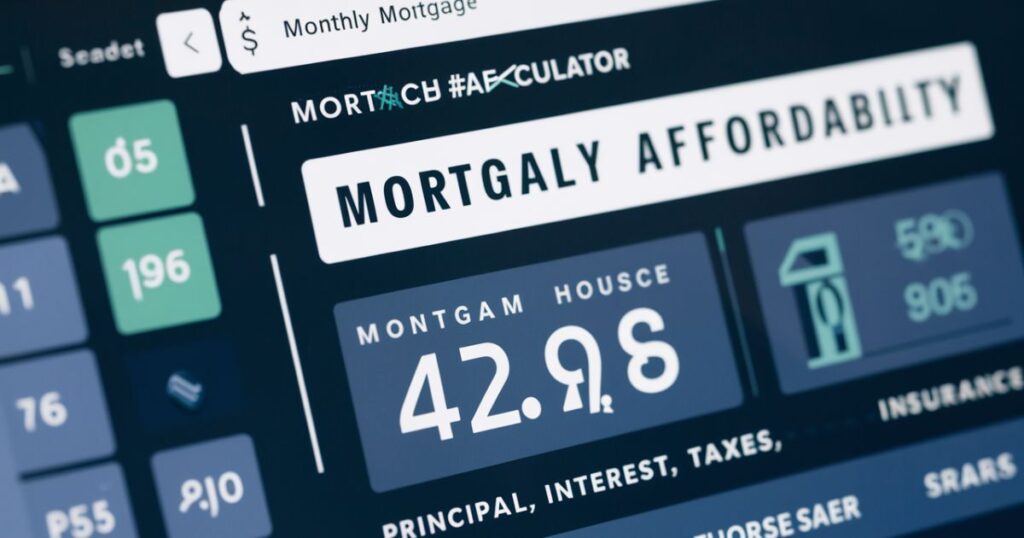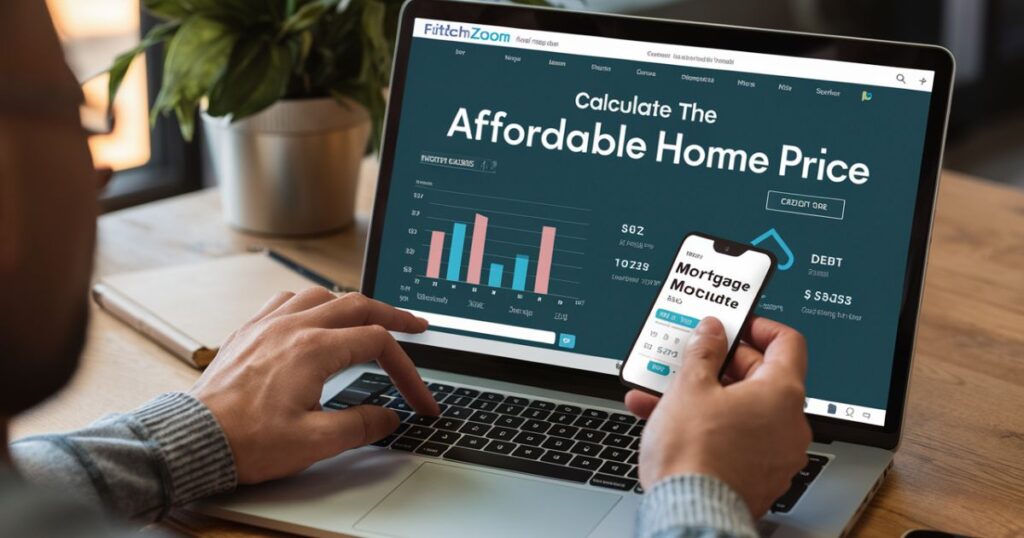With the help of financial technology platforms like Fintechzoom, prospective homeowners can now access powerful tools and insights to make informed decisions. In today’s ever-changing housing market, determining how much house you can afford is a crucial step in the homebuying process.
This comprehensive guide will walk you through the process of assessing your financial situation, understanding mortgage qualifications, and utilizing various budgeting calculators to determine your ideal home budget. It analyzes these factors to determine a realistic and manageable budget for your new home purchase, helping you plan confidently for your future.
The Instability in the Housing Market

The current housing market is characterized by fluctuating prices, changing interest rates, and varying levels of inventory. These factors can significantly impact home affordability and make it challenging for potential buyers to navigate the market.
According to recent data from the National Association of Realtors, median home prices have increased by 5.3% over the past year. Housing inventory remains low in many areas, creating competitive buying conditions. Additionally, interest rates have been volatile, affecting monthly mortgage payments. Given these market conditions, it’s more important than ever to have a clear understanding of how much house you can afford before beginning your home search.
How Much House Can I Afford?
Determining how much house you can afford involves a careful analysis of your financial situation, including income, debts, savings, and future financial goals. Fintechzoom offers a range of affordability calculators designed to help you assess your home buying power.
By taking some important factors into account, you can get a realistic picture of your home buying budget and avoid overextending yourself financially. Here are these key factors to consider when calculating how much house you can afford:
- Income stability
- Monthly debts and expenses
- Credit score
- Down payment amount
- Mortgage interest rates
- Property taxes and insurance costs
- Homeowners association fees (if applicable)
Assessing Your Financial Situation

Before moving into specific calculations, it’s essential to conduct a thorough assessment of your financial situation. This process will help you understand your readiness for homeownership and identify areas that may need improvement.
Affordability Assessment
Fintechzoom provides a step-by-step guide to assess your financial readiness for homeownership. This assessment typically includes analyzing your income sources and stability, reviewing your monthly expenses and debt obligations, evaluating your savings and investments, and assessing your credit score and history. By using Fintechzoom’s budgeting calculators, you can get a clear picture of your current financial standing and identify areas for improvement.
Mortgage Qualification
Understanding mortgage qualification criteria is crucial in determining how much house you can afford. Lenders typically consider factors such as credit score, debt-to-income ratio (DTI), employment history, down payment amount, and assets and reserves. Fintechzoom offers resources to help you understand these criteria and provides tips for improving your mortgage qualification prospects.
Credit Score Improvement
Your credit score plays a significant role in determining your mortgage eligibility and interest rate. Fintechzoom provides strategies for boosting your credit score, including paying bills on time, reducing credit card balances, avoiding new credit applications, and disputing errors on your credit report. By implementing these strategies and utilizing Fintechzoom’s credit monitoring tools, you can work towards improving your credit score and securing better mortgage terms.
Down Payment Planning
Saving for a down payment is often one of the biggest challenges in the homebuying process. Fintechzoom offers guidance on setting realistic savings goals, exploring down payment assistance programs, and evaluating different down payment options (e.g., 3.5% for FHA loans, 20% for conventional loans). Using Fintechzoom’s budgeting tools, you can create a personalized savings plan to reach your down payment goal.
Budgeting and Cash Flow Management
Managing your budget and cash flow is essential when preparing to buy a home. Budgeting involves tracking your income and expenses to understand your financial situation. It helps you prioritize savings for a down payment and ongoing homeownership costs. By creating a budget, you can identify areas where you can cut expenses or increase savings, making it easier to afford a mortgage.
Loan Approval
Getting approved for a mortgage is a crucial step in buying a home. Lenders assess your financial health, including your credit score, income stability, and debt-to-income ratio. It’s important to prepare by improving your credit score and paying down debts to increase your chances of approval. Understanding the loan approval process helps you anticipate requirements and gather necessary documents, expediting the process.
Comparison Shopping
Comparing mortgage offers from different lenders allows you to find the best terms and rates. It’s essential to research and compare interest rates, loan terms, and closing costs. This ensures you secure a mortgage that fits your financial situation and long-term goals. Comparison shopping empowers you to make informed decisions, saving money over the life of your mortgage.
Risk Management
Managing risks associated with homeownership involves protecting your investment and financial stability. This includes securing homeowner’s insurance to cover property damage and liability. Additionally, understanding and managing risks like fluctuating interest rates or unexpected expenses helps you prepare financially. By implementing risk management strategies, you can safeguard your home and financial future.
Homeowner’s Insurance and Association
When preparing to purchase a new home, it’s crucial to factor in Homeowners Insurance (HOI) and Homeowners Association (HOA) fees. HOI protects your property and belongings against damage and loss, ensuring mortgage approval and providing liability coverage. HOA fees, paid periodically, support upkeep of communal spaces and amenities within HOA-governed communities. Understanding these costs upfront helps budget effectively for homeownership and ensures compliance with community regulations.
The Role of a Mortgage in Home Buying

The role of a mortgage in buying a home is crucial. It provides the financial means to purchase a property by lending you the necessary funds, which you then repay over time with interest. Mortgages come in various types, such as fixed-rate and adjustable-rate, each with its own terms and conditions.
Understanding these options helps you choose the mortgage that best fits your financial situation and long-term goals. Mortgage payments typically include both principal (the amount borrowed) and interest, and the terms of the mortgage can greatly impact your monthly budget and overall financial stability.
Types of mortgages vary based on their interest rates and terms, influencing how borrowers repay their loans. Choosing the right mortgage type depends on your financial situation and long-term housing plans. Common types include:
TYPES OF MORTGAGES
- Fixed-Rate Mortgage: Offers stable interest rates throughout the loan term.
- Adjustable-Rate Mortgage (ARM): Features interest rates that may change periodically, affecting monthly payments.
- FHA Loan: Insured by the Federal Housing Administration, offering low down payment options for qualified buyers.
- VA Loan: Available to eligible veterans and active-duty military members, often with no down payment requirement.
- USDA Loan: Supports rural homebuyers with low to moderate incomes, offering competitive interest rates and no down payment requirement.
Calculating Potential Monthly Mortgage Payments
Fintechzoom provides affordability calculators to help you estimate your monthly mortgage payments. These calculators typically consider factors such as home price, down payment amount, interest rate, loan term, property taxes, homeowners insurance, and private mortgage insurance (if applicable). By inputting different scenarios into these calculators, you can get a clear picture of how various factors affect your monthly payments.
What Is the Debt-To-Income Ratio (DTI)?
The Debt-to-Income Ratio (DTI) compares your monthly debt payments to your gross monthly income. It helps lenders assess your ability to manage payments and repay debts. To calculate DTI, divide your total monthly debt by your gross income, then multiply by 100 for a percentage. Lower DTI percentages indicate healthier financial situations and make it easier to qualify for loans with better terms.
Lenders prefer lower DTI ratios as they suggest more income available for mortgage payments and other expenses. Understanding and maintaining a low DTI improves financial stability, increases loan eligibility, and secures favorable interest rates when applying for mortgages or other loans.
Considering Down Payments and Closing Costs
In addition to your monthly mortgage payments, it’s essential to factor in down payments and closing costs when determining how much house you can afford. Fintechzoom provides information on typical down payment requirements, closing cost estimates, and strategies for saving and budgeting for these expenses. By using Fintechzoom’s budgeting tools, you can create a comprehensive plan that accounts for all aspects of the home buying process.
Understanding down payments and closing costs is crucial when planning to buy a new home. They are initial expenses linked to homeownership that require budgeting and preparation.
- Down Payment: This upfront payment for a house purchase affects mortgage terms like interest rates and monthly payments. A larger down payment reduces the loan amount, lowering risk for lenders and showcasing financial responsibility.
- Closing Costs: These include fees for finalizing the mortgage and property transfer. They range from 2% to 5% of the loan amount and cover expenses like appraisal, title insurance, and property taxes.
- Saving Strategies: Fintechzoom offers tools and insights to help you save efficiently, such as automatic transfers and high-yield savings accounts. These strategies prepare you financially and align your home purchase with long-term goals.
Factors to Consider When Determining How Much House You Can Afford
Beyond the numbers, there are several qualitative factors to consider when determining your home buying budget. These include job stability and future income prospects, long-term financial goals (e.g., retirement, children’s education), economic factors and market trends, and emergency fund and risk management strategies. Fintechzoom offers investment insights and economic analysis to help you make informed decisions about your home buying budget.
- Job Stability and Future Income Prospects: Assess your job’s stability and potential for income growth. Review career trends and market conditions to gauge income security. Fintechzoom offers resources on alternative income streams and career advancement to boost financial security.
- Long-Term Financial Goals: Consider how homeownership fits into your financial plan. Align purchasing a home with goals like retirement savings, education funding, or starting a business. Ensure homeownership supports your overall financial well-being, guided by Fintechzoom’s insights.
- Economic Factors: Monitor economic indicators like GDP, inflation, and unemployment rates. Analyze local housing market trends to understand affordability. Fintechzoom provides analysis to make informed decisions based on economic conditions.
- Emergency Fund: Maintain an emergency fund covering 3 to 6 months of expenses. Use it for unexpected costs such as home repairs or medical bills. Fintechzoom stresses the importance of this fund for financial stability during homeownership.
Seeking Professional Advice

Seeking professional advice when buying a new home is crucial for first-time buyers. Financial advisors can assess your financial situation, identify areas for improvement, and offer strategies to strengthen your finances. They provide valuable guidance on managing debt, improving credit scores, smart saving, wise investing, and tax planning.
Consulting a financial advisor helps navigate complex financial decisions like budgeting, saving for a down payment, and understanding mortgage options. They tailor advice to your specific goals and risk tolerance, ensuring informed decisions aligned with your financial needs.
Prepare for consultations by gathering necessary documents like pay stubs, tax papers, bank statements, and credit reports. Honest communication with your advisor ensures personalized advice that enhances your confidence in affording and achieving your dream home.
Conclusion
Determining how much house you can afford is a complex process that requires careful consideration of various financial factors. By utilizing Fintechzoom’s comprehensive suite of budgeting calculators, affordability tools, and educational resources, you can gain a clear understanding of your home buying power and make informed decisions throughout the homebuying process.
Remember, the goal is not just to buy a home, but to do so in a way that aligns with your long-term financial well-being. With the right approach and tools, you can find a home that fits both your lifestyle and your budget.

